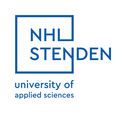Computer Science

The Computer Science programme at NHL Stenden offers a comprehensive curriculum that equips students with the skills needed to be a professional in the fields of artificial intelligence, digitalisation, robotics and data science. The programme also covers ethical considerations, privacy concerns and cyber security.
During the Computer Science programme you will learn how to program microcontrollers, for example, a small autonomous robot. The programme focuses on areas such as digitalisation, industrial automation and robotics, AI, machine learning and computer vision. You will be trained as a specialist in these areas over the course of the four-year programme. We also focus on areas such as ethics and security. In addition to the technical classes, you also learn professional skills, such as managing project-based work and agile development.
Explore your passion for smart technology and problem solving in the Computer Science bachelor's degree, where you'll develop skills in digitalization, data science, and hardware programming. This new programme in the Netherlands focuses specifically on artificial intelligence and machine learning, addressing the high demand for experts shaping innovations in healthcare, smart technologies, and beyond.
Gain international experience
Studying Computer Science at NHL Stenden means developing your skills in digitalization, data science and programming hardware, and exploring how it strongly influences various aspects of modern life. Our participation in RUN-EU means you can join Short Advanced Programmes and carry out projects with partner institutions in Europe. You can also go to one of the NHL Stenden’s Grand Tour locations in South Africa, Bali or Thailand in your third year. Or you can go on an exchange to a partner institution and delve into a totally new way of studying. With over 100 different minors on offer through NHL Stenden and held at locations all over the world, you're sure to find the perfect specialisation, from Certified Ethical Hacking to Hack@Sea, from Critical Thinking & Data-Driven Decision Making to E-business.
- Wypis ocen – jeśli wciąż się uczysz i dlatego nie masz jeszcze świadectwa ukończenia szkoły średniej, bardzo ważne jest załączenie wypisu. Szczegółowe informacje na temat sposobu wypełniania tego dokumentu oraz termin jego przesłania znajdziesz tutaj.
- Świadectwo dojrzałości i świadectwo ukończenia szkoły średniej – w przypadku ukończenia szkoły średniej nie potrzebujesz wypisów ocen – wystarczy, że do formularza aplikacyjnego załączysz Świadectwo dojrzałości wraz ze świadectwem ukończenia liceum/technikum.
Przed aplikacją sprawdź wymagania bezpośrednio na stronie uczelni. W przypadku problemów ze znalezieniem szczegółowych, aktualnych wymagań, skontaktuj się z konsultantami Kastu.
Spełnienie wymagań w zakresie języka angielskiego można udokumentować w jeden z następujących sposobów:
- IELTS - 6.0 (zalecane jest nie mniej niż 5.0 z każdej z części)
- TOEFL – 80
As a Computer Science expert, you’ll have highly developed conceptual skills, be able to work in and manage a team and have the knowledge and skills to understand and take on a variety of roles.
Careers open to you after graduation include:
- Industrial Automation and Robotics: contribute to the design and implementation of automated systems, working in sectors like manufacturing, process industries, and logistics, where robotics can optimize efficiency
- Research and Development: improve and develop machines and systems, for example in the health care industry, consumer electronics or manufacturing industry
- Data Science: analyse big data to identify trends, make predictions and support decision-making for insurance, financial or big tech companies or the government
- Machine Learning: with the rise of artificial intelligence (AI), you can work on developing algorithms and models for machine learning applications
- Embedded Systems: program smart solutions for available hardware and work on identifying new technological opportunities and innovations for organisations
